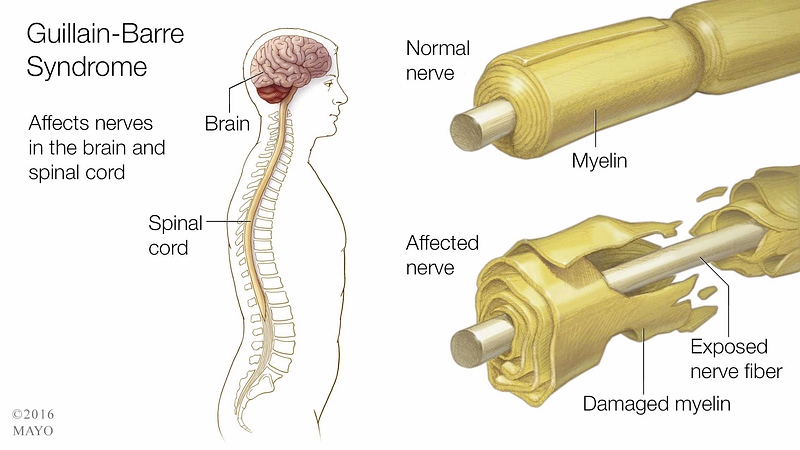Navigating Recovery: My Experience with Guillain-Barre Syndrome
Written on
Chapter 1: Understanding Guillain-Barre Syndrome
In August 2023, I received the diagnosis of Guillain-Barre Syndrome (GBS), a rare autoimmune disorder where my immune system mistakenly attacks my nervous system. The symptoms were quite distressing, including persistent vomiting, difficulty maintaining balance, and trouble standing upright.
Initially, doctors suspected a minor stroke, leading to treatments that proved ineffective. After seeking a second opinion, further tests ruled out the stroke but left the cause of my symptoms undetermined. After discontinuing the initial medications, my vomiting decreased significantly, providing me some relief.
Months of extensive testing at a third medical facility finally pinpointed GBS as the root cause. Regrettably, there is no definitive cure for this condition—only management strategies. The doctor advised against any further unnecessary tests and recommended focusing on nerve rehabilitation.
From my research, I learned that GBS typically lasts around two weeks, after which recovery begins. While some patients recover fully after several months, others may struggle with symptoms for years, and in severe cases, the condition can be fatal. The nerve damage often starts at the feet and ascends upwards. If it reaches the respiratory muscles, breathing assistance may become necessary.
Note: I share my story for those who may be experiencing similar challenges, hoping to prepare them both mentally and physically for what lies ahead. Additionally, I aim to inform supervisors of the difficulties faced by their employees in similar situations, fostering understanding and support.

Chapter 2: My Road to Recovery
In my journey towards recovery from Guillain-Barre Syndrome, I am pleased to report that my condition is improving. I no longer experience vomiting, and my overall health is gradually enhancing.
Some noticeable changes include:
- Increased fatigue, particularly in my legs.
- Occasional imbalance, requiring support during prolonged standing or walking.
- A menthol-like sensation in my calves, likely due to disrupted nerve signaling between my brain and body.
- An altered walking experience, at times feeling as though I’m walking on clouds, complicating my balance.
- Difficulty with spatial awareness, making driving and navigating crowded spaces particularly challenging.
Family members have also observed occasional slurring in my speech, which I initially dismissed. Driving has become more strenuous, as I must focus intensely on maintaining my lane, often marking visual cues to aid my steering.
What I Am Grateful For
Despite the challenges posed by Guillain-Barre Syndrome, I find myself appreciative of several aspects of my life:
- The severity of my condition remains relatively mild compared to others.
- My cognitive functions have not been significantly impaired.
- My workload has decreased, allowing me time to focus on recovery.
- My family has been incredibly supportive, ensuring my safety and well-being.
I am also thankful for my vehicle's lane-assist feature, which helps me maintain control while driving, a feature I now rely on heavily.
Chapter 3: Preparing for the Future
As I continue my recovery, I am proactively preparing for the future, both for myself and my family. Here are the steps I am taking:
Mental Preparation:
- Acknowledging that recovery may take years and embracing this reality.
- Engaging in good deeds and continuing my education about necessary legal frameworks.
Physical Preparation:
- Utilizing tools like the iPhone Health app to monitor my walking steadiness.
- Maintaining a balanced diet and managing my diabetes.
- Taking nerve-supportive supplements, such as B12.
Family Preparation:
- Educating my family about potential future challenges related to my condition.
- Organizing legal documentation for easy access should anything happen to me.
Work Preparation:
- Documenting my current projects and providing a clear roadmap for my team.
- Transferring important files to shared team cloud storage for continuity.
Legacy Planning:
- Appointing a legal trustee to manage my affairs if needed.
- Preparing my will and other essential documents for my family’s reference.
The second video titled "Story of Recovery: Puschel Sorensen's Guillain-Barré Syndrome | Brooks Rehabilitation" offers further insights into recovery from GBS, showcasing personal stories and rehabilitation strategies.
Conclusion
I hope that sharing my recovery journey from Guillain-Barre Syndrome can assist others facing similar challenges. Awareness of symptoms and timely medical intervention is crucial for effective management. Additionally, fostering understanding among supervisors regarding the struggles faced by their employees can create a supportive work environment.